最新职场英语教案-unit 3资料
职业英语unit 3教案
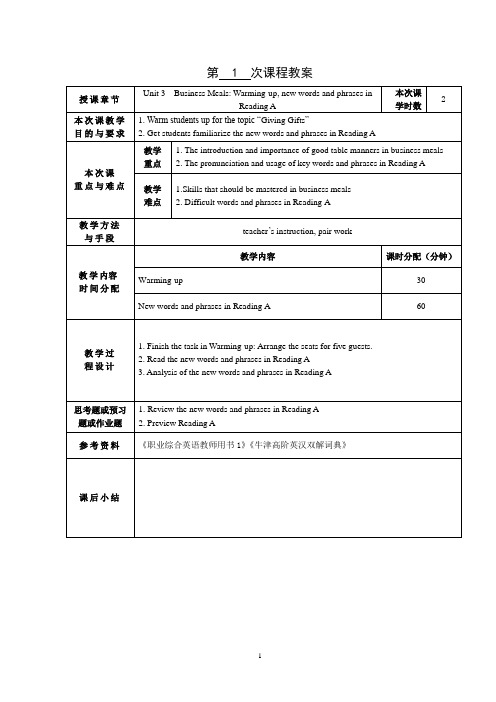
第 1 次课程教案●Period 11. Warming-upTask: Complete the following table seating arrangement.Step1: What are the principles of seating arrangement?1.Seat people who have common interests together.2.Pair male and female guests.3.Seat guests of honor in order. The most important person should be seated at the right hand ofthe host.Step2: Ask Ss to match the guest names to seats A-E.Step3: Ask some Ss to give their answers and explain them to the class.Step4: Comment briefly on their work and give the suggested answers.●Period 22. New words and phrases in Reading AStep1: Read the new words and phrases in Reading AStep2: Analysis of the new words and phrases in Reading A1) entertain v. 招待;给…娱乐e.g. entertain friends at dinner 招待朋友吃饭A teacher should entertain as well as teach. 教师不仅要教书,也要能引起学生兴趣。
相关派生词: entertaining a. 使人愉快的,有趣的an entertaining story 一个有趣的故事entertainment n. 招待,娱乐A cinema is a place of entertainment. 电影院是公众娱乐场所。
IT职场英语教学课件Unit 3 Milestones and Giants in IT Industry

Unit 3 Milestones and Giants in IT Industry1.通过背景讨论、阅读概念学习文章,充分了解Thompson和Ritchie如何设计和创建Unix,掌握行业术语;2.通过案例分析文章阅读和学习,学生了解21世纪个人电脑历史上的几个里程碑以及对社会意义,并能完成课后的相关案例分析报告;3.学生能够撰写商务新闻,并进行口头陈述4.了解科技术语翻译Part One Concept LearningTask 1 Think before You Read1.1 Serendipity,是意外发现珍奇事物的才能,机缘凑巧的意思。
课文里Thompson认为Unix系统的产生是serendipity(P38),老师可以带领学生理解Unix的诞生过程,Thompson的不断实验和改进,引导学生讨论Unix的诞生是否是机缘巧合,学生的结论很可能两个答案都有支持者,正如Jeff Bezos和Louis Pasteur的两句名言一样。
亚马逊的创始人Jeff Bezos认为一切发明也许都是机缘巧合,教师可以引导学生探究Bezos的成功路径,无论是早期投资谷歌公司,还是建立太空公司,还是目前进军硬件领域,每个决定都是他基于不断思考和创新,不怕失败的意志,绝非纯粹机缘。
Louis Pasteur是著名的生物学家,他坚信每一个机会都青睐有准备的人,因为他一直在实验室中坚持着,他的成功就是因为做了比别人多的实验,不曾放弃。
1.2其他10位IT行业先锋和领军人物以及他们的事迹(ppt里有)1.Mark ZuckerbergMark Elliot Zuckerberg (born May 14, 1984) is an American computer programmer, Internet entrepreneur, and philanthropist. He is the chairman, chief executive, and co-founder of the social networking website Facebook. His personal wealth, as of December 2015, is estimated to be $46 billion.2.Alan TuringAlan Mathison Turing (June 1912 –7 June 1954) was a pioneering British computer scientist, mathematician, logician, cryptanalyst and theoretical biologist. He was highly influential in the development of theoretical computer science, providing a formalisation of the concepts of algorithm and computation with the Turing machine, which can be considered a model of a general purpose computer. Turing is widely considered to be the father of theoretical computer science and artificial intelligence..3.Steven Paul "Steve" JobsSteven Paul “Steve” Jobs (February 24, 1955 –October 5, 2011) was an American information technology entrepreneur and inventor. He was the co-founder, chairman, and chief executive officer (CEO) of Apple Inc.; CEO and largest shareholder of Pixar Animation Studios; a member of The Walt Disney Company‘s board of directors following its acquisition of Pixar; and founder, chairman, and CEO of NeXT Inc. Jobs is widely recognized as a pioneer of the microcomputer revolution of the 1970s, along with Apple co-founder Steve Wozniak. Shortly after his death, Jobs’s official biographer, Walter Isaacson, described him as the “creative entrepreneur whose passion for perfection and ferocious drive revolutionized six industries: personal computers, animated movies, m usic, phones, tablet computing, and digital publishing.”4.Marvin MinskyMarvin Minsky (August 9, 1927 –January 24, 2016) has made many contributions to AI, cognitive psychology, mathematics, computational linguistics, robotics, and optics. His conception of human intellectual structure and function is presented in two books: The Emotion Machine and The Society of Mind (which is also the title of the course he teaches at MIT).He received the BA and PhD in mathematics at Harvard (1950) and Princeton (1954). In 1951 he built the SNARC, the first neural network simulator. His other inventions include mechanical arms, hands and other robotic devices, the Confocal Scanning Microscope, the "Muse" synthesizer for musical variations (with E. Fredkin), and one of the first LOGO "turtles". A member of the NAS, NAEand Argentine NAS, he has received the ACM Turing Award, the MIT Killian Award, the Japan Prize, the IJCAI Research Excellence Award, the Rank Prize and the Robert Wood Prize for Optoelectronics, and the Benjamin Franklin Medal.5.Linus Benedict TorvaldsLinus Benedict Torvalds (born December 28, 1969) is a Finnish-American software engineer, who is the creator of the Linux kernel and for a long time, principal developer; that became the kernel for operating systems (and many distributions of each), such as GNU and years later Android and Chrome OS. He also created the distributed revision control system git. He was honored, along with Shinya Yamanaka, with the 2012 Millennium Technology Prize by the Technology Academy Finland "in recognition of his creation of a new open source operating system for computers leading to the widely used Linux kernel".He is also the recipient of the 2014 IEEE Computer Society Computer Pioneer Award.6.John von NeumannJohn von Neumann (December 28, 1903 –February 8, 1957) was a Hungarian-American pure and applied mathematician, physicist, inventor, and polymath. He made major contributions to a number of fields, including mathematics (foundations of mathematics, functional analysis, ergodic theory, geometry, topology, and numerical analysis), physics (quantum mechanics, hydrodynamics, fluid dynamics and quantum statistical mechanics), economics (game theory), computing (Von Neumann architecture, linear programming, self-replicating machines, stochastic computing), and statistics.He was a pioneer of the application of operator theory to quantum mechanics, in the development of functional analysis, a principal member of the Manhattan Project and the Institute for Advanced Study in Princeton (as one of the few originally appointed), and a key figure in the development of game theory and the concepts of cellular automata, the universal constructor and the digital computer. He published 150 papers in his life; 60 in pure mathematics, 20 in physics, and 60 in applied mathematics.7.Gordon Earle MooreGordon Earle Moore (born January 3, 1929) is an American businessman, co-founder and Chairman Emeritus of Intel Corporation, and the author of Moore's law.Moore's law is the observation that the number of transistors in a dense integrated circuit doubles approximately every two years. The observation is named after Gordon E. Moore, the co-founder of Intel and Fairchild Semiconductor, whose 1965 paper described a doubling every year in the number of components per integrated circuit, and projected this rate of growth would continue for at least another decade.In 1975, looking forward to the next decade, he revised the forecast to doubling every two years. His prediction proved accurate for several decades, and the lawwas used in the semiconductor industry to guide long-term planning and to set targets for research and development. Advancements in digital electronics are strongly linked to Moore's law: quality-adjusted microprocessor prices, memory capacity, sensors and even the number and size of pixels in digital cameras.8.Bob MetcalfeBob Metcalfe (born April 7, 1946) is best known for co-inventing the Ethernet, today’s standard packet plumbing for the Internet, in 1973 and for founding 3Com Corporation in 1979 (merged with Hewlett-Packard in 2010), an early provider of Internet hardware and software. Starting in January 2011, he holds the position of Professor of Electrical Engineering and Director of Innovation at The University of Texas at Austin.On Aug. 3 in Berlin, the Internet Society inducted Professor Bob Metcalfe into the Internet Hall of Fame for his significant contributions to the advancement of the global Internet.Read more about Bob Metcalfe at /1998/11/metcalfe/ 9.Michael Saul DellMichael Saul Dell (born February 23, 1965) is an American business magnate, investor, philanthropist, and author. He is the founder and CEO of Dell Inc., one of the world’s leading se llers of personal computers (PCs). He was ranked the 41st richest person in the world on 2012 Forbes list of billionaires, with a net worth of US$22.4 billion as of December 2014.In 2011, his 243.35 million shares of Dell stock were worth $3.5 billion, giving him 12% ownership of the company. His remaining wealth of roughly $10 billion is invested in other companies and is managed by a firm whose name, MSD Capital, incorporates Dell's initials. On January 5, 2013 it was announced that Michael Dell had bid to take Dell Inc. private for $24.4 billion in the biggest management buyout since the Great Recession.10. Douglas Carl EngelbartDouglas Carl Engelbart (January 30, 1925 –July 2, 2013) was an American engineer and inventor, and an early computer and Internet pioneer. He is best known for his work on founding the field of human–computer interaction, particularly while at his Augmentation Research Center Lab in SRI International, resulting in the invention of the computer mouse, and the development of hypertext, networked computers, and precursors to graphical user interfaces.Engelbart's Law, the observation that the intrinsic rate of human performance is exponential, is named after him.2.1 Find out the Chinese equivalent to each of the following technical terms.2.2 Answer the following questions according to the passage.1.Who is Kenneth Thompson?Kenneth Thompson is an American pioneer of computer science. Having worked at Bell Labs for most of his career, Thompson designed and implemented the original Unix operating system and invented the B programming language.2.What is the project of Multics operating system designed for?Multics (Multiplexing Information and Computer Services) was an experimental operating system for GE-645 mainframe, developed in 1960s by MIT, Bell Labs, and GE.3.How was the idea of now ubiquitous Unix was born?In 1969, Bell Labs withdrew from the MULTICS project and Thompson decided to write his own operating system to run his game. With the help of his colleagues , they made experiment with some Multics concepts and redo it on a much smaller scale. Thus the idea of now ubiquitous Unix was born.4.Could you describe PDF 7?PDF 7 is a minicomputer, and Ken Thompson wrote the first UNIX system in assembly language on a PDF-7.5.What was the benefit of returning to UCB in 1975 for Ken?For Thompson, the benefit was, in addition to the nostalgia, the opportunity to work with a new group of people and the consequent additional intellectual stimulation.6.Ken viewed the great success of UNIX as being largely a matter of serendipity.What do you think of this “serendipity”?Serendipity comes after hard work and commitment before we finally discover or create valuable things.7.Ken viewed his own success in developing the system to the fact that he is abottom-up thinker. What did he mean by bottom-up thinker?A bottom-up thinker starts from the details rather than a general idea, who canlink elements together to form larger subsystems, which then in turn are linked, sometimes in many levels, until a complete top-level system is formed.8.Paraphrase on this this sentence, “It is also an example of how a single personwith an idea and dedication can accomplish something that eludes large organizations with huge concentrations of talent and massive budgets.”A single person with an idea and dedication can also change the world, whereaslarge organizations with talents and massive budgets sometimes will fail to accomplish.2.3 Complete the following sentences by using the words and expressions in the box.1.ubiquitous2.massive3.facilitate4.withdraw5.paradigmunch7.initially8.portable2.4 Further Discussion1. What is the role of Unix in IT development?The discussion can focus on two aspects: 1) it is free and open source; 2) it playsa vital role for Android system, which is built on top of the Linux kernel2. Share your experience of intellectual stimulation and summarize the keyelements for beneficial intellectual stimulation.The discussion could revolve around two phases: 1) reflecting the experience of learning with community, such as with classmates, with lab teammates, etc. 2) reflecting on the benefit of intellectual stimulation, for example, reasoning/ connection/questions/ideas etc.3.2 Translate the following sentences into Chinese.1. 20世纪60年代,美国电话电报公司贝尔实验室年轻的工程师肯尼斯(肯)·汤普森正为Multics操作系统项目工作。
最新中职英语Unit-3-教案-time
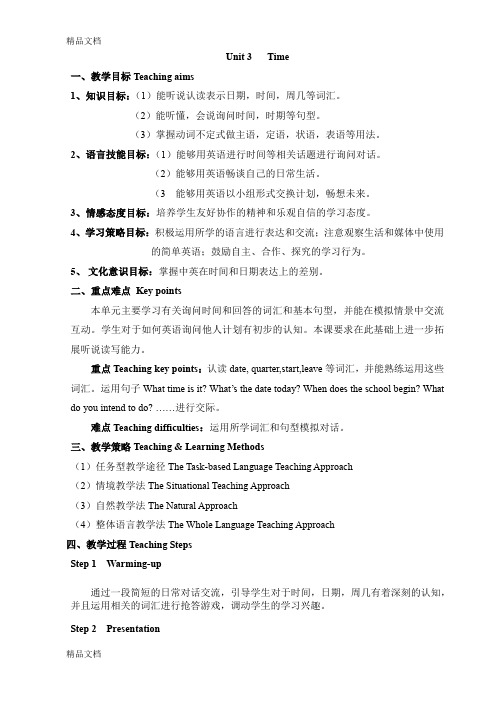
Unit 3 Time一、教学目标Teaching aims1、知识目标:(1)能听说认读表示日期,时间,周几等词汇。
(2)能听懂,会说询问时间,时期等句型。
(3)掌握动词不定式做主语,定语,状语,表语等用法。
2、语言技能目标:(1)能够用英语进行时间等相关话题进行询问对话。
(2)能够用英语畅谈自己的日常生活。
(3 能够用英语以小组形式交换计划,畅想未来。
3、情感态度目标:培养学生友好协作的精神和乐观自信的学习态度。
4、学习策略目标:积极运用所学的语言进行表达和交流;注意观察生活和媒体中使用的简单英语;鼓励自主、合作、探究的学习行为。
5、文化意识目标:掌握中英在时间和日期表达上的差别。
二、重点难点Key points本单元主要学习有关询问时间和回答的词汇和基本句型,并能在模拟情景中交流互动。
学生对于如何英语询问他人计划有初步的认知。
本课要求在此基础上进一步拓展听说读写能力。
重点Teaching key points:认读date, quarter,start,leave等词汇,并能熟练运用这些词汇。
运用句子What time is it? What’s the date today? When does the school begin? What do you intend to do? ……进行交际。
难点Teaching difficulties:运用所学词汇和句型模拟对话。
三、教学策略Teaching & Learning Methods(1)任务型教学途径The Task-based Language Teaching Approach(2)情境教学法The Situational Teaching Approach(3)自然教学法The Natural Approach(4)整体语言教学法The Whole Language Teaching Approach四、教学过程Teaching StepsStep 1 Warming-up通过一段简短的日常对话交流,引导学生对于时间,日期,周几有着深刻的认知,并且运用相关的词汇进行抢答游戏,调动学生的学习兴趣。
外研社 新职业英语 it英语 unit3教案
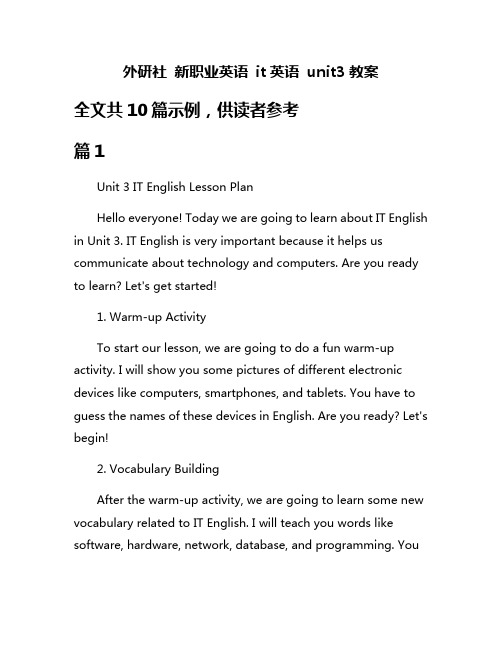
外研社新职业英语it英语unit3教案全文共10篇示例,供读者参考篇1Unit 3 IT English Lesson PlanHello everyone! Today we are going to learn about IT English in Unit 3. IT English is very important because it helps us communicate about technology and computers. Are you ready to learn? Let's get started!1. Warm-up ActivityTo start our lesson, we are going to do a fun warm-up activity. I will show you some pictures of different electronic devices like computers, smartphones, and tablets. You have to guess the names of these devices in English. Are you ready? Let's begin!2. Vocabulary BuildingAfter the warm-up activity, we are going to learn some new vocabulary related to IT English. I will teach you words like software, hardware, network, database, and programming. Youwill repeat after me to remember these words better. Are you ready? Let's start with the first word, software.3. Listening PracticeNext, we are going to do a listening practice exercise. I will play a recording of a conversation between two people talking about their favorite apps on their smartphones. You have to listen carefully and then answer some questions about the conversation. Are you ready? Let's listen to the recording now.4. Reading and Writing ActivityIn this part of the lesson, we are going to read a short passage about the history of computers. After reading the passage, you will write a summary of what you have learned. This will help you improve your reading and writing skills in English. Are you ready? Let's start reading the passage now.5. Speaking PracticeFor the speaking practice activity, we are going to do a role play exercise. I will pair you up with a classmate and give you a scenario to act out. For example, one of you will be a customer calling tech support for help with a computer problem, and the other will be the tech support agent. This will help you practicespeaking English in a real-life situation. Are you ready? Let's begin the role play exercise.6. Review and HomeworkAt the end of the lesson, we will review everything we have learned about IT English. I will ask you some questions to see how much you have understood. For homework, I will ask you to write a short paragraph about your favorite electronic device and why you like it. This will help you practice writing in English outside of the classroom. Are you ready to review and do your homework? Let's finish the lesson strong!That's it for today's IT English lesson. I hope you had fun learning about technology and computers. Remember to practice your English every day to improve your skills. See you next time! Bye bye!篇2Hello everyone! Today, we are going to talk about the lesson plan for Unit 3 of the New Dynamic English IT English textbook.First, let's start with a warm-up activity to get our brains thinking about IT English. We can watch a short video clip aboutdifferent IT professions and discuss what we see. This will help us get familiar with the topic and vocabulary.Next, we will move on to the vocabulary section. We will learn new words related to IT jobs such as programmer, web designer, and IT technician. We can play games like charades or memory matching to practice and reinforce our knowledge of these words.After that, we will dive into the grammar part of the lesson. We will learn about different verb tenses used in the context of IT jobs. For example, we will learn how to talk about past experiences, present responsibilities, and future goals in the IT industry.Following the grammar section, we will do a reading comprehension activity. We will read a short passage about a day in the life of an IT professional and answer questions to check our understanding. This will help us improve our reading skills and learn more about the daily tasks of IT workers.Finally, we will wrap up the lesson with a fun project. We can work in groups to create a presentation about our dream IT job. We can use our imagination to come up with creative ideas and present them to the class. This activity will give us a chance topractice our speaking and listening skills while also showcasing our knowledge of IT English.That's all for today's lesson plan! I hope you are excited to learn more about IT English and explore the world of technology. Let's get started and have a great time learning together! Thank you for listening!篇3Hi everyone, today I’m going to share with you our lesson plan for Unit 3 of the New Dynamic English IT English textbook. Are you ready? Let’s dive in!First, we’ll start with the warm-up activity. We’ll have a quick discussion about different IT jobs and what they involve. For example, we can talk about what a software developer does, or what a data analyst does. It’s important for us to understand the different roles in the IT industry.Next, we’ll move on to the vocabulary section. We’ll learn some key words and phrases related to IT jobs, such as “programming”, “networking”, and “cybersecurity”. We’ll practice saying and writing these words to make sure we remember them.After that, we’ll do a reading activity. We’ll read a short passage about a day in the life of an IT professional. We’ll discuss what we learned from the passage and answer some questions to test our understanding.Then, we’ll do a listening activity. We’ll listen to a conversation between two IT professionals discussing a new project. We’ll answer some questions about the conversation to check our listening skills.Finally, we’ll finish the lesson with a speaking act ivity. We’ll work in pairs to role-play a job interview for an IT position. We’ll take turns being the interviewer and the interviewee, and practice asking and answering questions about our skills and experience.That’s it for today’s lesson plan. I hope you’re excited to learn more about IT English and the exciting career opportunities in the IT industry. Let’s work hard and have fun learning together!篇4Unit 3: Jobs in ITHello everyone! Today, we are going to talk about some cool jobs in IT. IT stands for Information Technology, which is all about using computers and technology to do cool stuff.1. What is IT?IT is a field that uses computers to store, retrieve, transmit, and manipulate data. It includes everything from designing websites to creating video games to fixing computer problems.2. Jobs in ITThere are lots of different jobs you can do in IT. Here are a few examples:- Web Developer: A web developer designs and creates websites. They need to know programming languages like HTML, CSS, and JavaScript.- Software Engineer: A software engineer designs and develops computer programs. They work on things like apps, games, and operating systems.- Network Administrator: A network administrator manages computer networks, making sure they are running smoothly. They also help with things like setting up new devices and troubleshooting problems.- IT Support Specialist: An IT support specialist helps people with computer problems. They answer questions, fix issues, and teach people how to use technology.3. Why IT?There are lots of reasons why IT is a great field to work in. For one, it's always changing and evolving, so there are always new things to learn. Plus, IT jobs are in high demand, so you can make a good salary and have lots of job opportunities.4. How to Get StartedIf you're interested in a career in IT, there are lots of ways to get started. You can take classes in computer science or IT, get certifications in specific areas, or even teach yourself by practicing coding and building projects.So, there you have it! IT is a fun and exciting field with lots of cool jobs to choose from. Whether you want to design websites, develop apps, or help people with tech problems, there's something in IT for everyone. Good luck on your IT journey!篇5Title: My Lesson Plan for Unit 3 of New Dynamic English IT EnglishHi everyone! Today I want to share with you my super cool lesson plan for Unit 3 of New Dynamic English IT English. This unit is all about talking about technology and the internet, so get ready to learn some awesome new vocab and phrases! Let's dive in!1. Warm-up (10 minutes)To start off the lesson, I'll ask the students to talk about their favorite apps and websites. They can share with the class what they like to do online and why. This will get them thinking about the topic of the lesson and help them practice their speaking skills.2. Introduction to New Vocabulary (15 minutes)Next, I'll introduce the new vocabulary words for this unit. We'll learn words like "browser," "download," "upload," and "firewall." I'll make sure to explain each word clearly and give examples so that the students can understand and remember them.3. Reading and Comprehension (20 minutes)After learning the new vocabulary, we'll read a text together about online security. The students will read the text out loud,and then we'll discuss it as a class. I'll ask questions to check their understanding and encourage them to share their opinions.4. Speaking Practice (15 minutes)In this part of the lesson, the students will work in pairs to practice using the new vocabulary and phrases. I'll give them a list of questions to ask each other, like "Have you ever had a virus on your computer?" and "What do you do to protect your online privacy?" This will help them practice speaking and listening skills.5. Writing Activity (20 minutes)To wrap up the lesson, the students will write a short paragraph about their experience with technology. They can talk about their favorite devices, apps, and websites, as well as any challenges they've faced online. I'll remind them to use the new vocabulary and phrases we've learned in class.6. Homework (5 minutes)For homework, I'll ask the students to research a new technology trend or innovation and write a short report about it. They can present their findings to the class in the next lesson. This will help them practice their research and presentation skills.I hope you like my lesson plan for Unit 3 of New Dynamic English IT English. Let's have a great lesson together and learn lots of cool new things! Thank you for listening!篇6Unit 3 Lesson PlanHello everyone! Today we are going to learn about IT English in our New Horizon English textbook. Are you ready? Let's get started!Objective:- Learn new vocabulary related to IT- Understand different jobs in the IT industry- Practice listening and speaking skills in EnglishWarm-up:Let's start by asking a question: Do you know what IT means? IT stands for Information Technology. It's all about computers and technology!Vocabulary:1. Computer Programmer - someone who writes code to create computer software2. Web Designer - someone who designs websites3. Network Administrator - someone who manages computer networks4. Data Analyst - someone who analyzes data to find patterns and trends5. IT Support - someone who helps people with computer problems6. Software Engineer - someone who designs and develops softwareIntroduction:Now that we know the vocabulary, let's talk about different jobs in the IT industry. You can be a computer programmer and write code like a wizard! Or you can be a web designer and create beautiful websites. There are so many cool jobs in IT!Activities:1. Role-play: Let's pretend we are computer programmers writing code. Use your imagination and create a program!2. Drawing: Draw a picture of a website as a web designer. Be creative and make it look awesome!3. Group discussion: Talk about different IT jobs and choose one that you would like to do in the future.Listening:Listen to a recording about IT jobs and try to understand the different roles in the IT industry. Pay attention to the vocabulary we learned earlier!Conclusion:Great job, everyone! Today we learned a lot about IT English and different jobs in the IT industry. Keep practicing your English skills and you will become a master in IT!Homework:Write a short paragraph about your favorite IT job and why you would like to do it in the future. Don't forget to use the vocabulary we learned in class!That's all for today. See you next time! Happy learning!篇7Title: My Lesson Plan for Unit 3 of New Dynamic English IT EnglishHey guys, today I’m going to share with you my lesson plan for Unit 3 of the New Dynamic English IT English course. This unit is all about learning new vocabulary and phrases related to IT, so let’s get started!First, we are going to start the lesson with a fun warm-up activi ty. We will play a game called “IT Vocabulary Memory Match”. I will make cards with IT-related words on one side and their meanings on the other side. Students will work in pairs to match the words with their meanings. This will help them review the vocabulary they learned in the previous lesson.Next, we will move on to the new vocabulary in Unit 3. I will introduce words like “software”, “hardware”, “network”, “database”, and “programming”. I will use flashcards and pictures to help students understand the meaning of each word. We will practice pronouncing the words together to improve their pronunciation.After learning the new vocabulary, we will do a listening activity. I will play a short audio clip about a computer programmer talking about his job. Students will listen carefully and answer some questions about the audio. This will help them improve their listening skills and learn more about IT professions.Then, we will do a speaking activity where students will practice using the new vocabulary in sentences. I will ask them questions like “What software do you use for editing photos?” or “Have you ever programmed a computer game?”. This will give them the opportunity to practice speaking in English and apply the new vocabulary they learned.To wrap up the lesson, we will do a fun group activity. I will divide the class into teams and give them a scenario where they have to work together to solve an IT-related problem. This will encourage teamwork and collaboration among students while applying the new vocabulary in a real-world situation.I hope you guys are excited about my lesson plan for Unit 3 of the New Dynamic English IT English course. Let’s have a great lesson and learn more about the fascinating world of IT together!篇8Title: Let's Learn IT English Together!Hey guys! Today we are going to learn all about IT English in Unit 3 of our New Professional English textbook from Foreign Language Teaching and Research Press. Are you ready? Let's get started!First, we are going to learn about different IT jobs. Do you know what a database administrator does? They help to organize and store data in a database. It's like being a librarian for computers! And what about a network engineer? They help set up and maintain computer networks. Like a builder for the internet!Next, we will learn some common IT English phrases. For example, "Can you troubleshoot this problem for me?" means can you help me figure out what's wrong with this computer? And "I need to back up my files" means I need to make a copy of my important documents. These phrases will be super useful when you are working in IT!After that, we will practice some IT vocabulary. We will learn words like firewall, malware, and encryption. These words may sound a bit tricky, but don't worry, we will go through them together and you will soon be an IT expert!Finally, we will do some fun activities to test our IT English skills. We will have quizzes, games, and even act out some IT scenarios. It's going to be so much fun, I promise!So, are you excited to learn IT English with me? Let's dive into Unit 3 and become IT superstars together! Remember,practice makes perfect, so keep studying and soon you'll be fluent in IT English. Good luck and let's get started!篇9Unit 3: Jobs and ProfessionsHello everyone! Today we are going to talk about jobs and professions in our English class. Are you ready? Let's get started!1. Warm-up activity:To start our lesson, we can play a fun game called "Guess the Profession". I will give you clues about a specific job and you have to guess what it is. For example, I help sick people feel better. What am I? That's right, I'm a doctor! Let's continue with more professions.2. Vocabulary practice:Now, let's learn some new words related to jobs and professions. Repeat after me:- Teacher- Chef- Police officer- Firefighter- Nurse- Engineer- Pilot- Actor- AthleteGreat job! Now, let's match each profession with its definition. Who can give me an example of a person who does each job?3. Reading comprehension:Next, we will read a short story about a boy who wants to become a pilot when he grows up. Let's read the story together and answer some questions about it. What are the requirements for becoming a pilot? Why does the boy dream of flying a plane?4. Role-play activity:In groups of two or three, you will act out a dialogue between a customer and a salesperson in a store. One of you will play the customer who wants to buy a new phone, and the other will play the salesperson who explains the features of different models. Be creative and use the vocabulary we learned earlier!5. Writing task:Lastly, you will write a short paragraph about your dream job. What do you want to be when you grow up and why? Describe the responsibilities of that profession and why it interests you. Remember to use the vocabulary we practiced earlier in your writing.I hope you enjoyed today's lesson about jobs and professions. Remember, it's important to work hard and follow your dreams. Keep practicing your English and you can achieve anything you set your mind to. See you next time!篇10Unit 3: Jobs in ITHello everyone! Today we are going to talk about some cool jobs in IT. Do you know what IT stands for? IT stands for Information Technology. It's all about computers and technology. Let's learn more about it together!First, let's talk about a job called a software developer. A software developer is a person who creates and designs computer programs. They make all the cool apps and games that we love to play on our devices. They need to know how to codeand come up with new ideas for software. It's a really fun job for people who like to be creative!Next, let's learn about a job called a cybersecurity analyst. A cybersecurity analyst is like a detective for computers. They protect systems and networks from cyber attacks. They make sure that our information is safe and secure. It's a very important job in today's digital world.Another cool job in IT is a data scientist. A data scientist is someone who analyzes and interprets complex data. They use data to help companies make better decisions and understand their customers. They need to be good at math and computer programming. It's a job for people who love working with numbers and solving problems.Finally, let's talk about a job called a UX designer. A UX designer is a person who creates user-friendly interfaces for websites and apps. They think about how users will interact with the technology and make sure it's easy to use. They need to be creative and have a good eye for design. It's a job that combines art and technology.In conclusion, there are so many cool jobs in IT that you can explore. Whether you like coding, analyzing data, or designing interfaces, there is something for everyone in the world ofInformation Technology. Who knows, maybe one day you'll be the next big software developer or cybersecurity expert! Keep learning and exploring new things, and you'll go far in the world of IT.That's all for today, see you next time! Bye bye!。
成功职场英语unit3
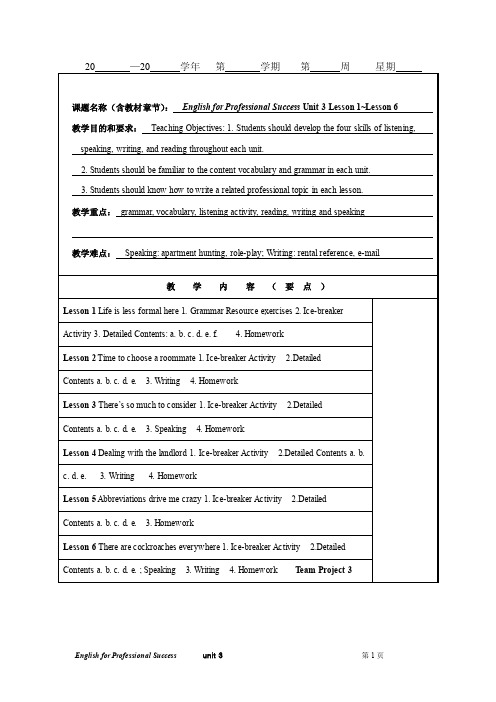
2. Ice-breaker Activity
Check vocabulary understanding apartment budget lease
landlord
requirement
3. Detailed Contents:
4. Homework
1) Review words and expressions in lesson 1. 2) Do practice in describing personal characteristics.
Lesson 2 Time to choose a roommate
b. Listening: Step 1: Have the students read the statements and options. Deal with vocabulary questions.
Step 2: Have the students try to guess the answers before they listen to the audio. Do not say if they are right or wrong.
教学难点: Speaking: apartment hunting, role-play; Writing: rental reference, e-mail
教 学 内 容 (要点) Lesson 1 Life is less formal here 1. Grammar Resource exercises 2. Ice-breaker Activity 3. Detailed Contents: a. b. c. d. e. f. 4. Homework Lesson 2 Time to choose a roommate 1. Ice-breaker Activity 2.Detailed Contents a. b. c. d. e. 3. Writing 4. Homework Lesson 3 There’s so much to consider 1. Ice-breaker Activity 2.Detailed Contents a. b. c. d. e. 3. Speaking 4. Homework Lesson 4 Dealing with the landlord 1. Ice-breaker Activity 2.Detailed Contents a. b. c. d. e. 3. Writing 4. Homework Lesson 5 Abbreviations drive me crazy 1. Ice-breaker Activity 2.Detailed Contents a. b. c. d. e. 3. Homework Lesson 6 There are cockroaches everywhere 1. Ice-breaker Activity 2.Detailed Contents a. b. c. d. e. ; Speaking 3. Writing 4. Homework Team Project 3
Unit Three 职场综合英语教程1
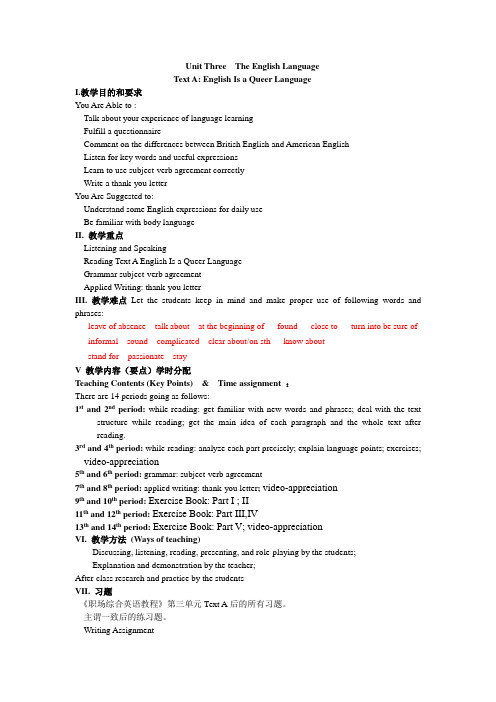
Text A: English Is a Queer LanguageI.教学目的和要求You Are Able to :Talk about your experience of language learningFulfill a questionnaireComment on the differences between British English and American EnglishListen for key words and useful expressionsLearn to use subject-verb agreement correctlyWrite a thank-you letterYou Are Suggested to:Understand some English expressions for daily useBe familiar with body languageII. 教学重点Listening and SpeakingReading Text A English Is a Queer LanguageGrammar subject-verb agreementApplied Writing: thank-you letterIII. 教学难点Let the students keep in mind and make proper use of following words and phrases:leave of absence talk about at the beginning of found close to turn into be sure of informal sound complicated clear about/on sth know aboutstand for passionate stayV 教学内容(要点)学时分配Teaching Contents (Key Points) & Time assignment :There are 14 periods going as follows:1st and 2nd period: while-reading: get familiar with new words and phrases; deal with the text structure while reading; get the main idea of each paragraph and the whole text after reading.3rd and 4th period: while reading: analyze each part precisely; explain language points; exercises; video-appreciation5th and 6th period: grammar: subject-verb agreement7th and 8th period: applied writing: thank-you letter; video-appreciation9th and 10th period: Exercise Book: Part I ; II11th and 12th period: Exercise Book: Part III,IV13th and 14th period: Exercise Book: Part V;video-appreciationVI. 教学方法(Ways of teaching)Discussing, listening, reading, presenting, and role-playing by the students;Explanation and demonstration by the teacher;After-class research and practice by the studentsVII. 习题《职场综合英语教程》第三单元Text A后的所有习题。
Unit3职业中专英语-基础模块1-教案
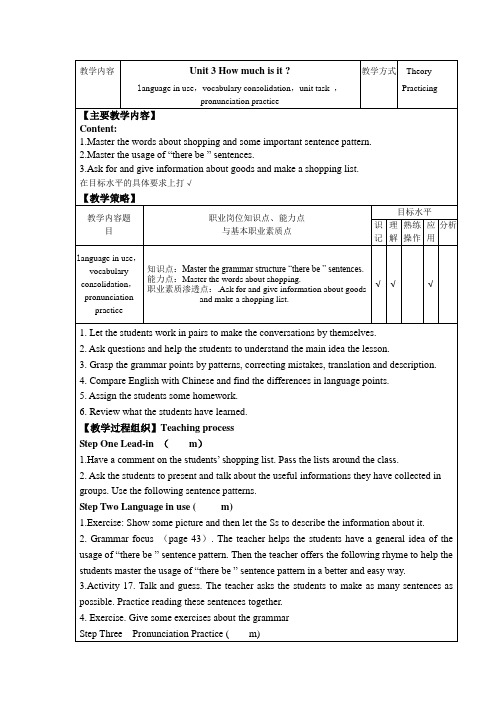
Unit 3 How much is it ?
language in use,vocabulary consolidation,unit task,pronunciation practice
教学方式
Theory
Practicing
【主要教学内容】
Content:
1.Master the words about shopping and some important sentence pattern.
3.Weபைடு நூலகம்have learned the pronunciation rules of the given two phonetics
【学生学习情况检测】
1.Activity 18. Talk and find. Talk about the picture and make a dialogue to desicribe the bedroom.
2.Activity 19.Read and group. Look at the poster and classify the same kind of the goods in.
3.Activity 20. Think and write. On the basis of the following scene, let the Ss to help Jack to make two shopping list.
3.Offer each student a phonetic chart
【小结】
Step Four: Summary ( m)
1.We have learned the words about shopping.
2.Masterthe usage of “there be ” sentence pattern.
最新中职英语授课教案:Unit3(1-3)
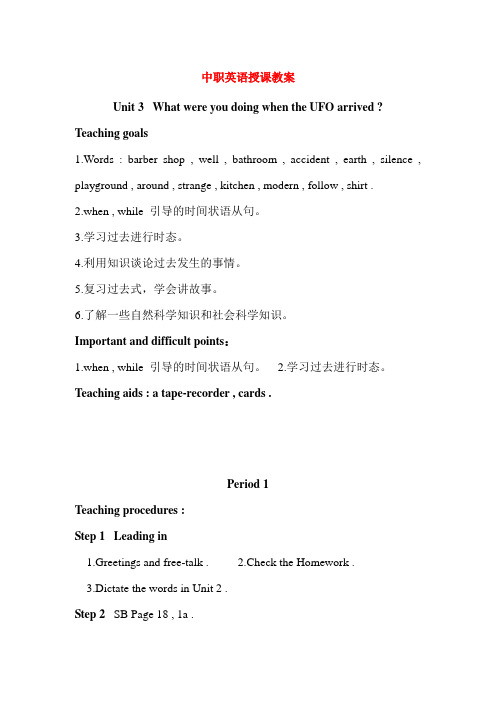
中职英语授课教案Unit 3 What were you doing when the UFO arrived ? Teaching goals1.Words : barber shop , well , bathroom , accident , earth , silence , playground , around , strange , kitchen , modern , follow , shirt .2.when , while 引导的时间状语从句。
3.学习过去进行时态。
4.利用知识谈论过去发生的事情。
5.复习过去式,学会讲故事。
6.了解一些自然科学知识和社会科学知识。
Important and difficult points:1.when , while 引导的时间状语从句。
2.学习过去进行时态。
Teaching aids : a tape-recorder , cards .Period 1Teaching procedures :Step 1 Leading in1.Greetings and free-talk .2.Check the Homework .3.Dictate the words in Unit 2 .Step 2 SB Page 18 , 1a .1.Point to the sentences .Read the sentences .Explain what each one means .2.Look at the picture .Point out the six people .Match the statements with the people in the picture .3.Check the answers .4.Practice reading .Step 3 SB Page 18 , 1b .1.Read the instructions .Make sure the Ss understand what they should do .2.Look at the dialogue in the picture .语法:过去进行时态的构成: was / were + doing .用法:表示过去某一时刻或某一段时间正在进行的动作,一般用时间状语来表示。
新职业英语基础篇unit3
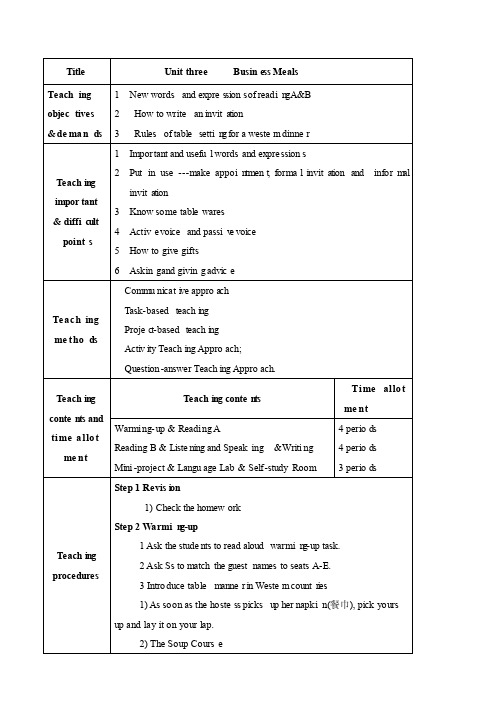
er. 2) Skimm ing A) Ask stude nts to read the text as quick ly as they can and tried to get the main idea of this passa ge. B) Ask stude nts to read the text again , then finis hTask1 on P36 3) Inten sive Readi ng ① As a form of busin ess enter taini ng, busin ess meals are incre
1) As soon as the hoste ss picks up her napki n(餐巾), pick yours
up and lay it on your lap.
2) The Soup Cours e
Dinne r usual ly begin swith soup. The large st spoon at your place is the soup spoon .It will be besid e your plate at the right -hand side.
Bread is taken in the finge rs and laid on the side plate or the edge of the large plate ;it is never taken with a fork. Butte r is taken from the butte rdish with the butte rknife and place don the side plate , not on one's bread .
新职业英语 素质篇 unit3教学提纲

□
I have never borrowed things from my classmates
without their approval.
□□
< Back Next > Return
Task 2
I would not leave work early, even if I were
□
sure that it would not be found out.
< Back Next > Return
Task 2
I have never cheated in exams, or routine class tests.
I don’t like to take credit for something that I haven’t done.
□□ □□
□ I study hard with or without the teacher’s supervision.
< Back Next > Return
Task 1
Honesty is such a 2. __lo__n_e_l_y_ word Everyone is so 3. _u__n_t_r_u_e_ 4. H__o__n_e_s_t_y is hardly ever heard And mostly what I need from you
□ If I had access to the Internet at my workplace, I
would only use it for work.
I would not slip any office supplies for my
□
职场英语教案-unit 3

大学英语教案Suggested answers:Conversations-2: First time on a college campusRead and listen to the conversation. Fill in the blanks to complete it.Procedures:1.Go through the new words and phrases for the conversation2. Have the students listen to the conversation twice and fill in the blanks with missing words3. Ask students to check through the answers together4. The teacher presents more background information about the tips in interview5. Next, students can role-play the conversationConversations-3: Advice on Selecting SubjectsStudents look at the following dialogue and arrange it in the correct order. Teacher presents the suggested answers and then asks students to work in pairs and read aloud the dialogue.Suggested answers: 1-10-8-11-9-6-4-5-7-2Conversation 4: Joining the Campus ClubGuide the students to work out a dialogue based on the specific situation using the given expressions in the box. Give a sample dialogue and ask students to work in pairs.Step 6 Homework1. Get familiar with the new words and expressions2. Preview the following text大学英语教案课时数 2教材名称实用职场英语综合教程1授课内容(标题)Unit 3 Intensive Learning: New Student Address教学目标1. Know the procedures and skills of invitations2. Grasp some keys words, expressions and some useful sentence patterns3. Understand the structure and the main idea of the text4. Know how to make preparations for attending an invitation 5.Practice reading skills教学重点、难点1. know how to write an invitation2. master the key words, expressions and some useful sentence patterns教学方法、辅助手段等Problem Presentation;Task-based TeachingStudents-centered LearningOn-line resources: English on line教学内容、教学设计:考勤Warming-upStep 1 Get familiar with some theme words.Look up the following words in a dictionary and pick out the words with the similar meaning of“适应”.Adapt orient resolve acclimate adjust habituate accommodate passionStep 2 Sentence Writing—The First Day in CollegeAsk students to write at least three sentences for each picture so that they form a complete story. Teacher presents more sample sentences for reference.Students practice to ask and answer the following questions in pairs, and then teacher asks some students to answer the questions orally.学]行大学英语教案。
外研社版职场实用英语交际教程(中级)教学课件unit3

Inputting
Task 2 Listen to the conversation again and fill in the blanks.
5. Keep the aircraft away from ____m_a_g_n_e_t_s____, otherwise it’ll be magnetised and not work normally, or even go out of control.
职场实用英语交际教程(中级)——Unit 3
Inputting
Language points
2. Yeah, and also be cautious to fly it in cold environments where it is below 5℃, because its performance will be reduced. cautious: /ˈkɔːʃəs/ a. being careful about what you say or do, especially to avoid danger or mistakes; not taking any risks 小心的;谨慎的 e.g. You are right to be cautious. 你谨慎是对的。
职场实用英语交际教程(中级)——Unit 3
Inputting
Task 1 Listen to the conversation and tick the topics that are mentioned about the drone.
✔◻ 1. feature ✔◻ 2. flying environment ◻ 3. storage ◻ 4. camera ✔◻ 5. battery
外研社职场实用英语交际教程(高级)教学课件Unit_3

Scenario
Vocabulary
4. Oh, I know. But we need to upgrade unremittingly to keep our product on top. unremittingly /ˌʌnrɪ'mɪtɪŋli/ adv. 不间断地;无休止地 e.g. Huatai adheres to seeking zero-defect quality unremittingly. 华泰公司坚持不懈地追求品质零缺陷。
performances and functions; • list two to three key points you need to consider when making a product
upgrade plan; • report a product upgrade plan.
职场实用英语交际教程(高级)——Unit 3
grill /ɡrɪl/ n. 烤架 e.g. Place under a hot grill until the nuts have toasted.
把这些坚果放在高温烤架下面烤熟。
职场实用英语交际教程(高级)——Unit 3
Scenario
Career tip
产品升级 (product upgrade) 是创造消费的前提条件。企业通过引进新产品或者改进 现有产品,提高单位产品的增加值,转向更高端的生产线,以超越竞争对手,扩大 市场占有额,从而获得销售利润。产品升级方案在深入调研市场需求和分析产品品 质的基础上形成, 对于产品升级具有重要作用。
3. You know that some other competitive brands have come onto the market within these two years, which decreases our market share to some extent. brand /brænd/ n. 品牌 e.g. Choose whichever brand you prefer. 挑你喜欢的那个牌子。
《Unit 3 Internship Language Practice》教学设计
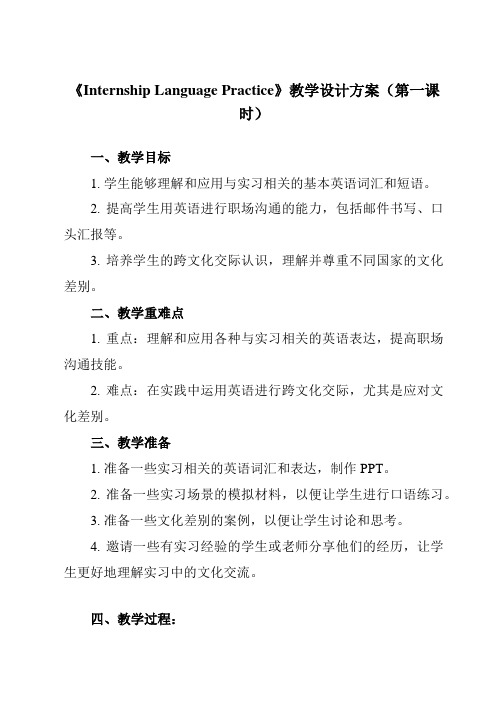
《Internship Language Practice》教学设计方案(第一课时)一、教学目标1. 学生能够理解和应用与实习相关的基本英语词汇和短语。
2. 提高学生用英语进行职场沟通的能力,包括邮件书写、口头汇报等。
3. 培养学生的跨文化交际认识,理解并尊重不同国家的文化差别。
二、教学重难点1. 重点:理解和应用各种与实习相关的英语表达,提高职场沟通技能。
2. 难点:在实践中运用英语进行跨文化交际,尤其是应对文化差别。
三、教学准备1. 准备一些实习相关的英语词汇和表达,制作PPT。
2. 准备一些实习场景的模拟材料,以便让学生进行口语练习。
3. 准备一些文化差别的案例,以便让学生讨论和思考。
4. 邀请一些有实习经验的学生或老师分享他们的经历,让学生更好地理解实习中的文化交流。
四、教学过程:一、课前热身1. 组织学生按照英语水平分小组,保证每个学生都有参与机缘。
2. 播放与职业英语相关的歌曲和视频,调动学生积极性。
二、导入新课1. 引导学生谈论职业实习的经历,启发学生对未来实习的思考。
2. 展示本课程的教学目标,让学生明确学习任务。
三、新课教学1. 讲解实习英语的基本观点和要求,包括职业英语词汇、语法和表达方式等。
2. 结合实例,引导学生掌握实习英语的基本表达方式。
3. 组织学生进行模拟实习场景的对话练习,提高学生的口语表达能力。
四、互动环节1. 鼓励学生进行小组讨论,分享实习经历和心得体会,提高口语表达能力。
2. 组织学生进行角色扮演,模拟实习场景中的不同角色,加深对实习英语的理解和应用。
3. 教师对学生练习中的问题进行点评和指导,确保学生掌握正确的表达方式。
五、小结作业1. 教师对本节课的教学内容进行总结,强调实习英语的重要性和应用方法。
2. 安置课后作业,要求学生继续模拟实习场景对话,提高口语表达能力。
3. 鼓励学生继续关注职业英语的发展动态,为未来的实习做好准备。
六、课外拓展1. 提供一些与职业英语相关的课外阅读材料和网站,鼓励学生自主学习。
《Unit 3 Internship Language Practice》教学设计教学反思-2023
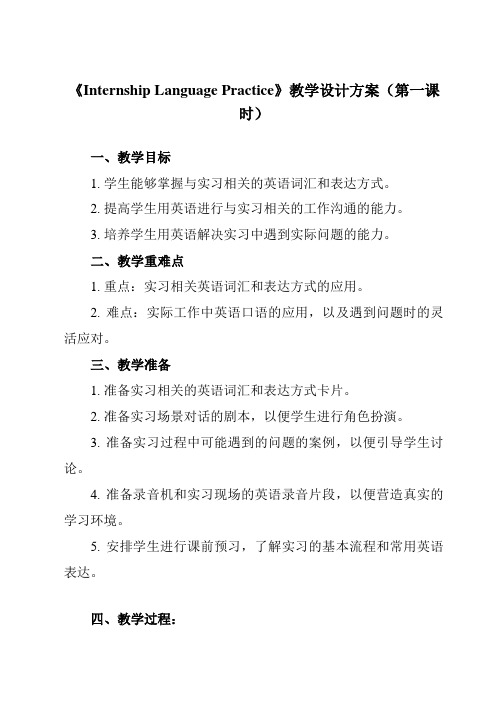
《Internship Language Practice》教学设计方案(第一课时)一、教学目标1. 学生能够掌握与实习相关的英语词汇和表达方式。
2. 提高学生用英语进行与实习相关的工作沟通的能力。
3. 培养学生用英语解决实习中遇到实际问题的能力。
二、教学重难点1. 重点:实习相关英语词汇和表达方式的应用。
2. 难点:实际工作中英语口语的应用,以及遇到问题时的灵活应对。
三、教学准备1. 准备实习相关的英语词汇和表达方式卡片。
2. 准备实习场景对话的剧本,以便学生进行角色扮演。
3. 准备实习过程中可能遇到的问题的案例,以便引导学生讨论。
4. 准备录音机和实习现场的英语录音片段,以便营造真实的学习环境。
5. 安排学生进行课前预习,了解实习的基本流程和常用英语表达。
四、教学过程:1. 导入(Lead-in)利用多媒体展示一些实习或工作场景的图片,让学生用英语描述这些场景,并询问他们是否曾经参加过实习。
通过这个环节,可以激发学生的学习兴趣,同时了解他们对实习的理解和认识。
2. 新课呈现(Presentation)讲解《Internship Language Practice》课程的目的和意义,介绍课程的主要内容和学习方法。
通过PPT展示一些实习中的常用英语表达,如如何进行面试、如何报告工作进展、如何与同事沟通等。
同时,可以通过一些案例分析,让学生了解实习中英语的应用。
3. 小组活动(Group work)将学生分成若干小组,每组选择一个实习场景进行角色扮演。
要求小组内成员分工合作,模拟实习场景,用英语进行交流和沟通。
教师可以在现场进行指导,帮助学生解决遇到的问题。
4. 课堂互动(Class interaction)在小组活动结束后,邀请学生分享他们在模拟实习中的经验和感受,并针对一些常见的实习英语表达进行提问和讨论。
教师也可以分享一些自己的实习经历,与学生分享实习中的经验和教训。
5. 作业布置(Homework)要求学生回家后搜集一些与实习相关的英语表达和词汇,并尝试用这些表达和词汇描述自己的一次实习经历。
《Unit 3 Information at Work Listening and Speaking
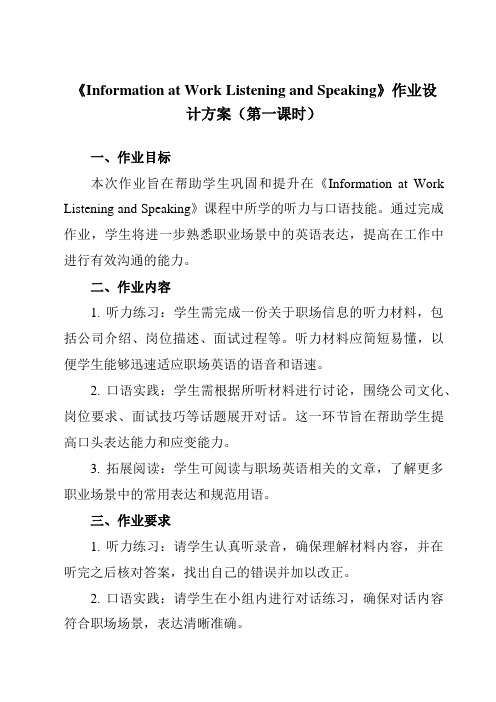
《Information at Work Listening and Speaking》作业设计方案(第一课时)一、作业目标本次作业旨在帮助学生巩固和提升在《Information at Work Listening and Speaking》课程中所学的听力与口语技能。
通过完成作业,学生将进一步熟悉职业场景中的英语表达,提高在工作中进行有效沟通的能力。
二、作业内容1. 听力练习:学生需完成一份关于职场信息的听力材料,包括公司介绍、岗位描述、面试过程等。
听力材料应简短易懂,以便学生能够迅速适应职场英语的语音和语速。
2. 口语实践:学生需根据所听材料进行讨论,围绕公司文化、岗位要求、面试技巧等话题展开对话。
这一环节旨在帮助学生提高口头表达能力和应变能力。
3. 拓展阅读:学生可阅读与职场英语相关的文章,了解更多职业场景中的常用表达和规范用语。
三、作业要求1. 听力练习:请学生认真听录音,确保理解材料内容,并在听完之后核对答案,找出自己的错误并加以改正。
2. 口语实践:请学生在小组内进行对话练习,确保对话内容符合职场场景,表达清晰准确。
3. 拓展阅读:请学生认真阅读文章,并做好笔记,记录下自己不熟悉的表达和用语,以便后续复习。
4. 作业提交:请学生在规定时间内提交作业,形式可以是音频、视频或文本,确保内容完整且质量达标。
四、作业评价1. 作业完成情况:将根据学生提交的作业情况进行评分,包括听力练习、口语实践和拓展阅读三个部分。
2. 互动参与度:将根据学生在小组讨论中的表现进行评价,包括参与度、合作精神及表达能力等。
3. 创新性:将关注学生在作业中的创新表现,鼓励学生在口语实践中尝试新的表达方式和沟通技巧。
五、作业反馈部分在学生完成作业后,我们将提供反馈和建议,帮助学生更好地改进和提高。
具体反馈将包括以下几个方面:1. 听力练习:是否理解录音内容?语言表达是否准确?有哪些需要改进的地方?2. 口语实践:对话内容是否符合职场场景?表达是否流畅?有哪些需要改进的地方?3. 阅读理解:文章中的表达和用语是否理解?有哪些知识点需要进一步学习和掌握?通过本次作业,学生将有机会巩固和提升在《Information at Work Listening and Speaking》课程中所学的听力与口语技能,增强职业沟通能力。
中职《英语基础教程》第三册-Unit3-电子教案
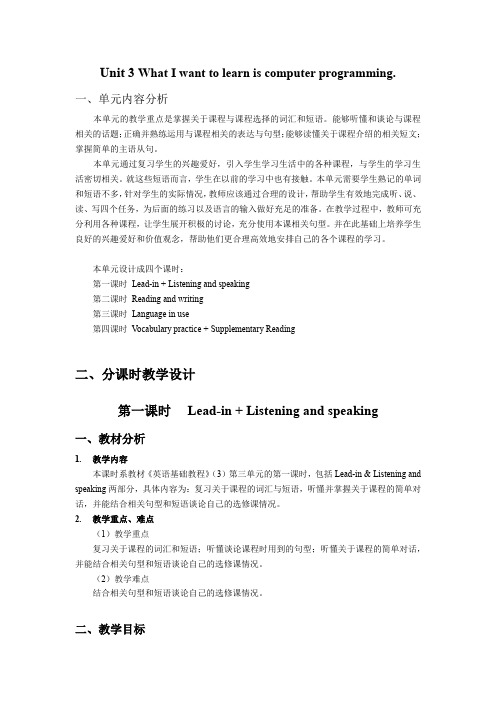
Unit 3 What I want to learn is computer programming.一、单元内容分析本单元的教学重点是掌握关于课程与课程选择的词汇和短语。
能够听懂和谈论与课程相关的话题;正确并熟练运用与课程相关的表达与句型;能够读懂关于课程介绍的相关短文;掌握简单的主语从句。
本单元通过复习学生的兴趣爱好,引入学生学习生活中的各种课程,与学生的学习生活密切相关。
就这些短语而言,学生在以前的学习中也有接触。
本单元需要学生熟记的单词和短语不多,针对学生的实际情况,教师应该通过合理的设计,帮助学生有效地完成听、说、读、写四个任务,为后面的练习以及语言的输入做好充足的准备。
在教学过程中,教师可充分利用各种课程,让学生展开积极的讨论,充分使用本课相关句型。
并在此基础上培养学生良好的兴趣爱好和价值观念,帮助他们更合理高效地安排自己的各个课程的学习。
本单元设计成四个课时:第一课时Lead-in + Listening and speaking第二课时Reading and writing第三课时Language in use第四课时V ocabulary practice + Supplementary Reading二、分课时教学设计第一课时Lead-in + Listening and speaking一、教材分析1.教学内容本课时系教材《英语基础教程》(3)第三单元的第一课时,包括Lead-in & Listening and speaking两部分,具体内容为:复习关于课程的词汇与短语,听懂并掌握关于课程的简单对话,并能结合相关句型和短语谈论自己的选修课情况。
2.教学重点、难点(1)教学重点复习关于课程的词汇和短语;听懂谈论课程时用到的句型;听懂关于课程的简单对话,并能结合相关句型和短语谈论自己的选修课情况。
(2)教学难点结合相关句型和短语谈论自己的选修课情况。
二、教学目标1.知识目标(1)学习并识记关于课程的词汇与短语,如:Latin dance computer programming Japanese tourism English appliance repair Chinese painting ask for your advice optional course get a certificate time schedule sign up by oneself(2)学会能套用谈论课程的句型,如:I’d like to ask for your advice. Sure. Go ahead.What I want to learn is…Can I get a certificate? You can get it …What’s the time schedule? There are …How do I sign up? You may fill in …2.能力目标(1)能听懂关于课程的对话。
中职英语-基础模块(下)-unit3全部教案

中职英语-基础模块(下)-unit3全部教案学时教案(总第17-24学时)授课题目Unit 3 English Study授课学时8 课型讲授□讨论□习题□复习□其它:教学目标1. Train the students’ speaking and reading ability.2.Learn and master some useful words、phrases and sentence patterns and put it into practice.3. Understand the main idea and structure of reading.4. Promote active attitude towards learning english.教学重点1. Understand the main idea and structure of reading.2. Students can retell the text and use the words and expressions learned in the text to write their own essay.3. Grasp sentence patterns.教学难点1. How to improve the students’ reading ability.2. how to make suggestions in english.教具、课件Ppt. Comprehensive course, blackboard, platform, chalk教学过程备注1-2学时:Step1: GreetingsGreet students cheerfully to cheer them up for this English lesson.Step2: Tell students the general arrangements of classroom teaching and learning and their tasks in this class.Step3: teaching the pronouciation of the new words and phrases and give expanlation to them.• 1. join &join in &take part in &attend辨析•join表示参加某一团体、组织机构,并作为其中的一员。
- 1、下载文档前请自行甄别文档内容的完整性,平台不提供额外的编辑、内容补充、找答案等附加服务。
- 2、"仅部分预览"的文档,不可在线预览部分如存在完整性等问题,可反馈申请退款(可完整预览的文档不适用该条件!)。
- 3、如文档侵犯您的权益,请联系客服反馈,我们会尽快为您处理(人工客服工作时间:9:00-18:30)。
Procedures:
1.Have the students listen to the material (2 times) and fill in the blanks with the missing words
2. Ask some students to write the correct spelling of the word
3. Present more examples to illustrate the key words in the sentence to make sure that students know how to use them
5)W: I’m having a lot of trouble with logic and it seems my professor can’t explain it in a way that makes sense to me.
M: You know, there is a touring service on campus. I was about to drop statistics before they helped me out.___________
4)M: How are you getting on with your essay, Mary? I’m having a real hard time with mine.
W: After two sleepless nights, I’m finally throw with it._________
3)) Do you want to go to the lecture this weekend? I heard that the guy who is going to delete the lecture spent a year living in the rainforest.____________
Students-centered Learning
English On-line resources
OxfordDictionary
教学内容、教学设计:
考勤
Step 1 Lead-in
Give a brief lead-in talk on invitations.
Step 2 Starter
I. Sentence stress practice
Listen to the dialogue and fill in the blanks. The teacher then ask the sutdents to retell the dialogue to their partner.
FA: Do you want a /′kænsə/?
Passenger: A what?
3.Listen and fill in the blanks from the words you hear.
1. Key words, nce patterns;
2. Work out dialogues based on situations in invitations
教学方法、辅助手段等
Problem Presentation;
Task-based Teaching
2. Understand the dialogues and the passages
3. Practice the skills of Listening and Speaking
4. Capable of making proper responses to invitations
教学重点、难点
4. Give suggested answers
1.My name is Helen Ware, W-A-R-E. Can I get a class permit for biology._______________
2)You’re taking a course with Professor Johnson. What’s your impression so far?. ___________
大学英语教案
课时数
2
教材名称
实用职场英语综合教程1
授课内容(标题)
Unit3New Environments, New starts: Listening and Speaking
教学目标
1.Master the basic language and useful expressions of invitations
FA: Do you want a /′kænsə/?
Passenger: A cancer(癌症)?
FA: _______
Passenger: Oh, no. I’m fine. Thank you
II.Working with Words—Academic Studies
1.Students read aloud the useful expressions after the recording. Then complete the word spider with the expressions. The teacher leads students to learn about the expressions and presents suggested answers.
Attend a lecturebrush upon concentrate on
School timetable serminarpolitical science
Teaching assistantspecialized coursepunctual
Revise the notedoze offcomputer programming
